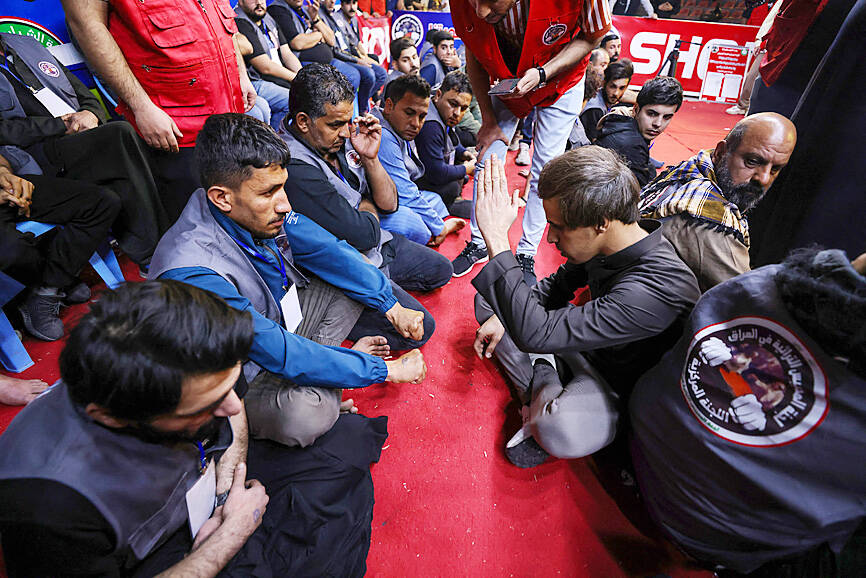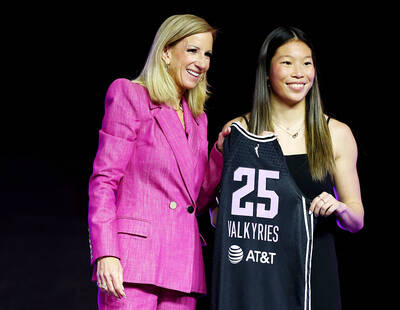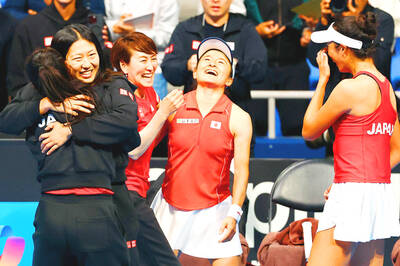In a Baghdad arena, a crowd cheers to the rhythm of drums, not for a soccer match but for a fiery centuries-old game enjoyed by Iraqis during Ramadan called mheibes.
“It’s a heritage game, the game of our ancestors, which unites all Iraqis,” said Jassem al-Aswad, a longtime mheibes champion in his early 70s and now president of the game’s national federation.
The game involves members of one team hiding a ring — mehbis in Arabic — and the captain of the opposing team trying to guess who has it in the palm of his hand.

Photo: AFP
He has to do so within 10 minutes.
Played during the holy Muslim fasting month of Ramadan, the game first appeared as early as the 16th century in Ottoman-era Baghdad, Iraqi folklore expert Adel al-Ardawi said.
More than 500 fans and players gathered in the stands and on the field for two matches: the Baghdad neighbourhood of Kadhimiya against the southern city of Nasiriyah, and the capital’s al-Mashtal district versus a team from the port city of Basra.
Everyone watched as the 40 players on one team huddled together under a blanket to avoid prying eyes, and decided who would hide the mehbis or signet ring worn by many Iraqi men.
Sitting on the ground or on chairs, the members of the team hiding the ring then adopted serious expressions. Some closed their eyes, while others crossed their arms or even clenched their fists.
The rival team captain carefully read these facial expressions and body language to try and guess who had the ring — before pronouncing the verdict.
When the first team failed to guess correctly, the other team scored a point and the crowd went wild.
“Iraqis love football the most, but mheibes comes a close second. It’s in our blood,” Kadhimiya captain Baqer al-Kazimi said.
The clean-shaven 51-year-old, who wears a black robe called a jellaba, said he inherited his love of the game from his father.
Though mheibes was impacted during decades of conflict, including at the peak of the sectarian war between 2006 and 2008 marked by suicide attacks and kidnappings, Kazimi said he and others continued playing even during those dark years.
He said that only the COVID-19 pandemic forced players to put their hobby on hold.
“Despite the sectarian violence, we played in cafes,” he said, recalling one game between players from the Sunni neighbourhood of Adhamiya and those from Kadhimiya, a predominantly Shiite area.
The two districts were separated by a bridge that had been closed for years because of the violence.
“We played on the bridge. Sunnis and Shiites met,” he said. Ahmed Maala from Basra recalled a game with a team from Baghdad that lasted all night.
“I learned the game by playing with friends and family,” he said. “Mheibes will go down in history for its very large fan base throughout Iraq.”
Passion for the game runs so deep that sometimes arguments erupt among players, even escalating into physical violence.
In a country with about 400 teams, annual competitions see players from across the nation competing against each other, with 10 teams qualifying in Baghdad alone to represent the city’s different neighborhoods.
Mheibes champion Aswad said he hopes the game would one day expand beyond Iraq’s borders.
“Just as Brazil popularized football, we will transmit this game to the whole world,” he said.

College basketballer Kaitlyn Chen has become the first female player of Taiwanese descent to be drafted by a WNBA team, after the Golden State Valkyries selected her in the third and final round of the league’s draft on Monday. Chen, a point guard who played her first three seasons in college for Princeton University, transferred to the University of Connecticut (UConn) for her final season, which culminated in a national championship earlier this month. While at Princeton, Chen was named the Ivy League tournament’s most outstanding player three times from 2022 to last year. Prior to the draft, ESPN described Chen as

College basketballer Kaitlyn Chen (陳凱玲) has become the first player of Taiwanese descent to be drafted by a WNBA team, after being selected by the Golden State Valkyries in the third and final round of the league's draft yesterday. Chen, a point guard who played her first three seasons in college for Princeton University, transferred to the University of Connecticut (UConn) for her final season, which culminated in a national championship on April 6. While at Princeton, Chen was named the Ivy League tournament's most outstanding player three times from 2022 to last year. Prior to the draft, ESPN described Chen as a

Japan yesterday secured a second consecutive Billie Jean King Cup finals appearance with a 2-1 win over 2023 champions Canada, thanks to Ena Shibahara and Shuko Aoyama’s 6-3, 5-7, 6-2 win over Kayla Cross and Rebecca Marino in the qualifying doubles decider. Shibahara and Aoyama powered through the opening set 6-3, breaking twice for a quick 3-0 lead. Cross and Marino hit back in the second, edging it 7-5 to level the match, before the Japanese pair regained control in the third. Canada’s 18-year-old Victoria Mboko edged Shibahara 6-4, 6-7 (8/10), 7-5 in a marathon opening clash. Mboko fired eight aces to

DAY OF BLOWOUTS: Elsewhere, the Lakers clinched the third seed in the Western Conference with a 140-109 pounding of the under-strength Houston Rockets The Denver Nuggets on Friday improved their playoff position, with a triple double from Nikola Jokic helping them to a 117-109 win over the Memphis Grizzlies. The Serbian put up 26 points, 13 assists and 16 rebounds. The triple-double performance, his 34th this season, ensured that he will finish the regular season as just the third NBA player to average a triple double across an entire season. The win meant the Nuggets improved to 49-32 on the season and gave them a real chance of grabbing fourth place and home-court advantage in the playoffs. Aaron Gordon top scored with 33 points for Denver,